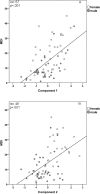Romantic relationship breakup: An experimental model to study effects of stress on depression (-like) symptoms
- PMID: 31150432
- PMCID: PMC6544239
- DOI: 10.1371/journal.pone.0217320
Romantic relationship breakup: An experimental model to study effects of stress on depression (-like) symptoms
Abstract
The occurrence of a stressful event is considered to increase the risk of developing depression. In the present study we explore whether the breakup of a romantic relationship can be used as an experimental model to study a depression-like state during a period of stress in individuals without a psychiatric disorder. The primary aim of our study was to investigate: 1) whether individuals with a recent romantic relationship breakup (''heartbreak") demonstrate symptoms of depression, 2) how to describe heartbreak characteristics based on data from a comprehensive questionnaire battery, and 3) whether this description can capture severity of depression symptoms. Secondary, we were interested in gender differences with regard to the above study objectives. Subjects who have experienced a relationship breakup in the preceding six months (N = 71) or are in a romantic relationship (N = 46) participated in our study. A questionnaire battery was administered to acquire information related to depression, mood, the breakup and (former) relationship. Principal Component Analysis with Procrustes bootstrapping was performed to extract components from the questionnaire data. Even though our sample of individuals who recently have experienced a relationship breakup can be on average considered non-depressed, group-level depression scores were elevated compared to individuals in a relationship (p = .001) and 26.8% reported symptoms corresponding to mild, moderate or severe depression. We described heartbreak by two principal components interpreted as ''sudden loss" and ''lack of positive affect", respectively. Highly significant correlations between the component scores and depression scores were found (p < .001 and p < .001, respectively), although these correlations differed between the genders. Based on these findings, we propose that the experience of a romantic relationship breakup is a viable experimental model to examine symptoms of depression in individuals without a psychiatric disorder. This way, stress-related coping and depression vulnerability can be studied in further research.
Conflict of interest statement
The authors have declared that no competing interests exist.
Figures


Similar articles
-
Working Memory Alterations After a Romantic Relationship Breakup.Front Behav Neurosci. 2021 Apr 9;15:657264. doi: 10.3389/fnbeh.2021.657264. eCollection 2021. Front Behav Neurosci. 2021. PMID: 33897388 Free PMC article.
-
Coping with a breakup: negative mood regulation expectancies and depression following the end of a romantic relationship.J Pers Soc Psychol. 1991 Feb;60(2):327-34. doi: 10.1037//0022-3514.60.2.327. J Pers Soc Psychol. 1991. PMID: 2016673
-
Plenty of Fish in the Ocean: How do Traits Reflecting Resiliency Moderate Adjustment After Experiencing a Romantic Breakup in Emerging Adulthood?J Youth Adolesc. 2019 May;48(5):949-962. doi: 10.1007/s10964-019-00985-5. Epub 2019 Feb 11. J Youth Adolesc. 2019. PMID: 30747355
-
Intense, Passionate, Romantic Love: A Natural Addiction? How the Fields That Investigate Romance and Substance Abuse Can Inform Each Other.Front Psychol. 2016 May 10;7:687. doi: 10.3389/fpsyg.2016.00687. eCollection 2016. Front Psychol. 2016. PMID: 27242601 Free PMC article. Review.
-
[Mild traumatic brain injury and postconcussive syndrome: a re-emergent questioning].Encephale. 2012 Sep;38(4):329-35. doi: 10.1016/j.encep.2011.07.003. Epub 2011 Aug 31. Encephale. 2012. PMID: 22980474 Review. French.
Cited by
-
Association of improvement and worsening of depressive symptoms with arthritis.BMC Geriatr. 2024 Nov 5;24(1):909. doi: 10.1186/s12877-024-05498-w. BMC Geriatr. 2024. PMID: 39501170 Free PMC article.
-
Attachment and Breakup Distress: The Mediating Role of Coping Strategies.Emerg Adulthood. 2024 Feb;12(1):41-54. doi: 10.1177/21676968231209232. Epub 2023 Oct 18. Emerg Adulthood. 2024. PMID: 38124712 Free PMC article.
-
Romantic relationship dissolutions are significantly associated with posttraumatic stress symptoms as compared to a DSM-5 Criterion A event: a case-case-control comparison.Eur J Psychotraumatol. 2023;14(2):2238585. doi: 10.1080/20008066.2023.2238585. Eur J Psychotraumatol. 2023. PMID: 37526098 Free PMC article.
-
Romantic Unions and Mental Health: The Role of Relationship Churning.J Health Soc Behav. 2023 Jun;64(2):243-260. doi: 10.1177/00221465221126091. Epub 2022 Oct 19. J Health Soc Behav. 2023. PMID: 36259176 Free PMC article.
-
Young People's Voices and Science for Overcoming Toxic Relationships Represented in Sex Education.Int J Environ Res Public Health. 2022 Mar 11;19(6):3316. doi: 10.3390/ijerph19063316. Int J Environ Res Public Health. 2022. PMID: 35329005 Free PMC article.
References
-
- Field T, Diego M, Pelaez M, Deeds O, Delgado J. Breakup distress in university students. Adolescence. 2009;44: 705–27. - PubMed
Publication types
MeSH terms
Grants and funding
LinkOut - more resources
Full Text Sources
Medical


